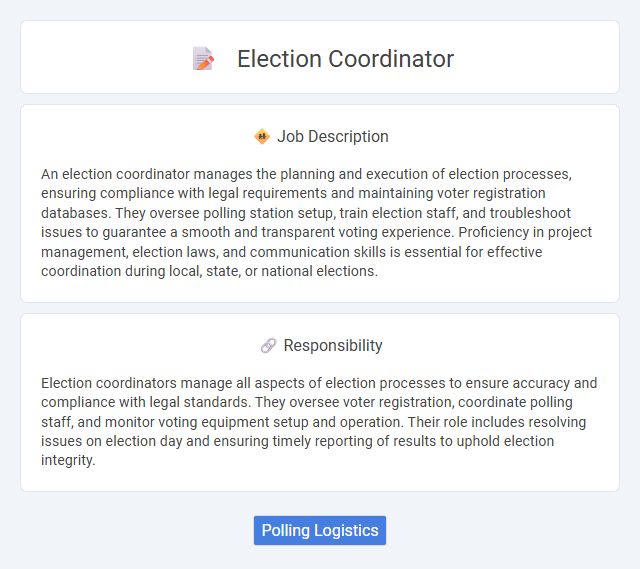
An election coordinator manages the planning and execution of election processes, ensuring compliance with legal requirements and maintaining voter registration databases. They oversee polling station setup, train election staff, and troubleshoot issues to guarantee a smooth and transparent voting experience. Proficiency in project management, election laws, and communication skills is essential for effective coordination during local, state, or national elections.
Individuals who demonstrate strong organizational skills, attention to detail, and the ability to manage stressful, fast-paced environments are likely suitable for the role of an election coordinator. Those who remain impartial and can effectively communicate with diverse groups may have a higher probability of success in this position. People who struggle with multitasking or maintaining neutrality during conflicts might find it challenging to meet the job's demands.
Qualification
An election coordinator must possess strong organizational and leadership skills, typically requiring a bachelor's degree in political science, public administration, or a related field. Experience with election laws, voter registration processes, and campaign management software is essential to ensure compliance and efficiency. Proficiency in communication and problem-solving enables effective coordination between election officials, volunteers, and the public.
Responsibility
Election coordinators manage all aspects of election processes to ensure accuracy and compliance with legal standards. They oversee voter registration, coordinate polling staff, and monitor voting equipment setup and operation. Their role includes resolving issues on election day and ensuring timely reporting of results to uphold election integrity.
Benefit
An election coordinator likely provides significant benefits by ensuring smooth and efficient election processes, which may increase voter confidence and participation. They might reduce the risk of errors or fraud through meticulous planning and oversight of polling operations. Their role probably enhances communication between election officials and the public, contributing to overall transparency and trust in the election results.
Challenge
Managing an election coordinator role likely involves navigating complex logistical challenges and ensuring strict adherence to regulations. The position probably demands quick problem-solving skills to address unexpected issues such as equipment failures or voter concerns efficiently. Balancing multiple tasks while maintaining transparency and accuracy in the election process could be critical to the job's success.
Career Advancement
Election coordinators manage the planning and execution of voting processes, ensuring compliance with legal standards and voter accessibility. Gaining expertise in electoral laws and project management can lead to advancement as senior election officials or election directors. Developing strong organizational and communication skills enhances opportunities for leadership roles in government agencies or nonprofit organizations dedicated to electoral integrity.
Key Terms
Polling Logistics
Election coordinators specializing in polling logistics manage the setup and operation of polling stations to ensure smooth voting processes. They coordinate the distribution of ballots, voting machines, and staff schedules to optimize efficiency and compliance with election regulations. Their expertise ensures accurate voter flow management and timely reporting of election results.
 kuljobs.com
kuljobs.com